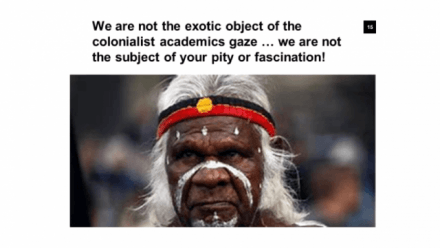On Tuesday, 17 September 2019, together with RDHP Team members Ben Silverstein and Julie Rickwood, I attended a seminar focused on Research Ethics with Aboriginal and Torres Strait Islander Australians, co-hosted by the ANU Centre for Social Research and Methods, and the ANU Research Services Division. The seminar focused on the importance of reciprocity and the building of trust—ideas which should form the basis of all research, not only with Aboriginal and Torres Strait Islander peoples.
The first speaker was Professor Dennis Foley from the University of Canberra. Foley opened with some key questions: why do people want to research Aboriginal Australia; and what right do white people have to do this research? He continued with a brief tour of useful theoretical frameworks and methodological approaches, including grounded theory, critical theory, critical social theory, Lester-Irabinna Rigney’s ideas on Indigenist research, and the Indigenous standpoint model discussed by Aileen Moreton-Robinson and Martin Nakata, and by Foley in his own work. Of particular interest was the model he presented showing relationships between the physical, human, and sacred worlds and the ideas of Japanangka West, placed in the context of the ocean, land, sky, and stone, water, wind and forest.
Though necessarily cautionary, Foley also encouraged both Indigenous and non-Indigenous researchers to continue to engagement with Aboriginal and Torres Strait Islander peoples. He concluded with a call for work that is useful and relevant.
The second presenter was Professor Michael Martin, Chair of ANU’s Human Research Ethics Committee. Martin covered a number of common issues and questions, including reminders that: there is no ‘low risk’ research in this space (though that doesn’t necessarily mean research is ‘high risk’); Aboriginal and Torres Strait Islander people be involved as partners in the full research process, from design to outputs; and, there are many complexities involved in areas such as consultation, research agreements, use of cultural knowledge, and intellectual property which require careful consideration.
Martin provided a number of useful references and links, from national requirements published by the ARC and NHMRC, to AIATSIS Guidelines (which have been under review and will be updated shortly) and Bevlyne Sithole’s ARPNet Dilly Bag.
Throughout the presentations, and the questions and discussion which followed, there was a focus on Indigenous involvement—as leaders of and partners in research, not just as subjects or participants—providing evidence of a continuing and welcome shift in the perspectives and practices of research. Importantly, the RDHP Team has the benefit of its Advisory Committee, experienced researchers who offer the sage advice necessary to be at the forefront of this shift.


